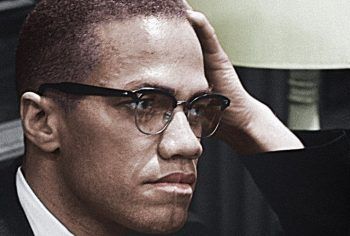Garrett Felber in Boston Review:
 More than fifty years after his death, Malcolm X remains a polarizing and misunderstood figure. Not unlike the leader he is too often contrasted with—Martin Luther King, Jr.—he has been a symbol to mobilize around, a foil to abjure, or a commodity to sell, rather than a thinker to engage. As political philosopher Brandon Terry reminded us in these pageson the fiftieth anniversary of King’s death this year, “There are costs to canonization.” The primary vehicle of canonization in Malcolm’s case has been The Autobiography of Malcolm X, which has been translated into thirty languages and has been widely read—by students and activists alike—across the United States and abroad.
More than fifty years after his death, Malcolm X remains a polarizing and misunderstood figure. Not unlike the leader he is too often contrasted with—Martin Luther King, Jr.—he has been a symbol to mobilize around, a foil to abjure, or a commodity to sell, rather than a thinker to engage. As political philosopher Brandon Terry reminded us in these pageson the fiftieth anniversary of King’s death this year, “There are costs to canonization.” The primary vehicle of canonization in Malcolm’s case has been The Autobiography of Malcolm X, which has been translated into thirty languages and has been widely read—by students and activists alike—across the United States and abroad.
…There have long been rumors of three missing chapters among scholars; some think Haley cut them from the book following Malcolm’s assassination because their politics diverged or the book had transformed during his tumultuous last year. Whatever the reasoning, “The Negro” is a fragment of the book Malcolm intended to publish—a book that would be virtually unrecognizable to readers of his autobiography today. We will never fully know that book, of course, but “The Negro” chapter forces us, finally, to engage with it.
…In “The Negro,” he called Democrats and Republicans “labels that mean nothing” to black people. Elsewhere he noted how in the United Nations, there are those who vote yes, those who vote no, and those who abstain. And those who abstain often “have just as much weight.” A sign of political maturity, he believed, was to first register black people, then organize them, and vote only when a candidate represented their interests.
This analysis culminated in one of Malcolm’s most famous addresses, “The Ballot or the Bullet.” Delivered in April 1964 shortly after breaking with the Nation of Islam and forming his independent organization Muslim Mosque, Inc., Malcolm told a Cleveland audience, “A ballot is like a bullet. You don’t throw your ballots until you see a target, and if that target is not within your reach, keep your ballot in your pocket.” Many historians have seen the speech as Malcolm’s first ideological break from the Nation of Islam, an index of his developing political thought. “The Negro,” by contrast, shows this thought as an extension of the Nation of Islam’s political development rather than a departure. Even the title of his speech may have been borrowed from the pages of Muhammad Speaks; in 1962, a front-page story about the struggle in Fayette County, Tennessee, to register black voters was subtitled: “Fayette Fought For Freedom With Bullets and Ballots.”
More here. (Note: Throughout February, we will publish at least one post dedicated to Black History Month)
